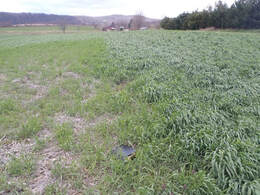CONSERVATION CORNER
A weekly blog for all things conservation
 Small grain field (grass would be the same) with extra nutrients on the right and none on the left Small grain field (grass would be the same) with extra nutrients on the right and none on the left By: Kevin Brown, Ag Team Leader So, my first comment is “nothing can compete with well managed grass in the northeast”. If you manage and feed your grasses correctly, they will outcompete everything else. If you have weeds, it is because the grasses are not being managed as well as they can be. They are lacking a good cutting schedule or nutrients. Depending on the weed, cutting them on a timely basis will help a lot. Most weeds we deal with are annuals. They live one year. You cut hem before they go to seed then you have that many less weed seeds next year. Do that a few years in a row and there are “no” seeds left to germinate. Now, that does not work on perennials. They will be harder to deal with. Call me and we can discuss how to handle them. It will depend on the weed. Fertility. There are a few different ways to get fertility into the ground. The obvious one is to buy fertilizer. That is pricy, but it is one of the easiest ways to get nutrients in the soil back up. Another is manure, or compost. If you don’t have animals, find someone who does and see if you can get their manure. Manure is probably the best one. It not only supplies NPK, but also organic matter. Organic matter (OM) does HUGE things in the soil- feeds microbes, soaks up moisture (a huge benefit this year), mulches the ground a little, makes better pore space in the soil, etc. When I say manure, I am talking anything along the lines of manure, compost, bedding, old rotten hay, etc. It all has nutrients, and it all adds OM.
Another way to really make a difference in the soil, that you may not know, is mow the grass back on the ground and let it lay. Let it rot back into the ground and feed the microbes. (think lawn mowing). This can make huge differences. Why don’t we see the same thing just letting it stand there? I don’t know, but we don’t. Try it once. Mow it down in wide swaths and see what it looks like next year. It will be darker green, thicker and more lush (yield more) where the old windrow was. People have actually started doing this on purpose, as a management tool. Even I struggle with that one. If I have extra hay at the end of the year and I am not going to harvest it, I would do this. However, I have still not convinced myself to take one cutting every year and mow it back on the ground. Some have though. I have seen people start to pasture like this. Cows trample ½ and eat ½. Sound crazy? The results they are getting are phenomenal. Yields are way up. It is an organic way to feed the soil. It really works. Soil health and microbes couldn’t be happier. You are at least helping to replace the “bank account” a little bit. There might be other ways I am not thinking about right now, but these are the most common ways. If you want more yield, try one of them.
0 Comments
Leave a Reply. |
AuthorsVarious staff at the Bradford County Conservation District Archives
July 2024
Categories
All
|
|
Bradford County Conservation District
Stoll Natural Resource Center 200 Lake Road, Suite E | Towanda PA 18848 Phone: (570)-485-3144 |
